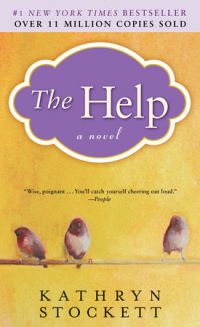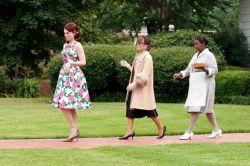The Help (2011)
The Help is a drama movie who released on August 10, 2011 (United States) and directed by Tate Taylor. This movie based on Kathryn Stockett's 2009 novel with the tittle "The Help".The Help is a safe film about a volatile subject. Presenting itself as the tale of how African-American housekeepers in the South treated their employers during Jim Crow's days, this is also how they inspired young white women to write a best-selling book about them, and how this book changed the history of the author's mother. We are happy for the two white women, there is a third, but at the end of the film, it is still Jackson, Mississippi and Ross Barnett are still governors.[1]
This movie received 5 nominations and 1 winner, including Best Picture-Drama, Best Original Song as a nomination, and Oktavia Spencer won the Golden Globe Award for Best Supporting Actress (2012).[2]
Kathryn Stockett's first novel "The Help" tells the story of a black maid who worked in a black and white home in Jackson, Mississippi, southern Mississippi (Jackson) in the early 1960s, and a 22-year-old woman from Austria. The story of Miss Eugenia "Skeeter" Phelan, who graduated from Ole Miss, go to Longleaf, her cotton plantation, and find her beloved maid and nanny.[3]
Plot
Skeeter (Stone) was born in Mississippi in the 1960s. She was a girl from the South. She aspired to become a novelist after graduating from college. But when she tried to interview black women who had lived in black lives, she Subverted her friend's life and Mississippi City life and took care of the outstanding southern family.
Aibileen worked hard to raise her employer’s child (Aibileen’s seventh child) and keep the house tidy, but none of this distracted her because she had recently lost her son, who was in the white boss He died of work-related injuries while turning around. Two events brought Skeeter and Aibileen closer: Skeeter was troubled by a copy of Jim Crow's law she found in the library, and received a letter from a New York publisher interested in Skeeter's idea of writing true stories about domestic servants.
Skeeter is approaching Aibileen with the idea of writing narratives from the point of view of 12 black maidens. Aibileen brought her best friend Minny, a cheeky maid who was also fired for telling her own thoughts and told her story. Hearing their story, Skeeter opened his eyes and saw the true prejudice she grew up with. Along the way, Skeeter discovered in December that her beloved maid Constantine had mysteriously disappeared from Skeeter's life and had died. After Constantine's daughter, Lulabelle, and Skeeter's (Emma Stone) mother, Charlotte, got into a confrontation, Constantine was fired. She moved to Chicago with Lulabelle and died three months later. At the end of December, Skeeter sent a manuscript to Elaine Stein in New York City, which contained the story of a maid named "Help."
After all, Minny shared the secrets about Hilly in Skeeter's book, which kept Hilly silent. This book became a powerful force to speak out to black girls, and prompted the Jackson community to rethink the well-designed boundary between white and black.
Controversy
Some people criticize racism, and this movie cannot be avoided. But some people say that "help" is not a useful resource for understanding racism at all. With the sale of racing books and the rise of racism, many Americans are turning to literature and movies to help them understand race and cultural issues. However, the problem is that “helping” is not a true view and experience of the racial injustice faced by blacks.[4]Viola Davis, who played Aibileen Clark in the movie, said that she regretted her role and emphasized that the problem is not the part itself. This film is a drama set in the 1960s. It is about a white woman (Emma Stone) writing a book about a local black maid (the maid played by Davis). The film pays more attention to white people. Not black.[5] In Usatoday, she also said: "I just don't think... I heard the maid's voice. I know Aibileen. I know Minnie. They are my grandmother. They are my mother. I know if when you watch a movie, you think about the whole premise. I want to know what it was like to work for a white person and raise children in 1963. I want to hear your true feelings about it. I have never heard of a movie."[6]
Reference
- ↑ https://www.rogerebert.com/reviews/the-help-2011
- ↑ https://www.goldenglobes.com/film/help
- ↑ https://www.cliffsnotes.com/literature/h/the-help/book-summary
- ↑ https://www.usatoday.com/story/entertainment/movies/2020/06/08/the-help-isnt-helpful-resource-racism-heres-why/5322569002/
- ↑ https://www.vanityfair.com/hollywood/2018/09/viola-davis-the-help-regret
- ↑ https://www.usatoday.com/story/entertainment/movies/2020/06/08/the-help-isnt-helpful-resource-racism-heres-why/5322569002/


